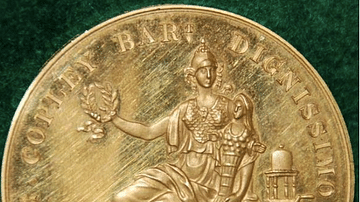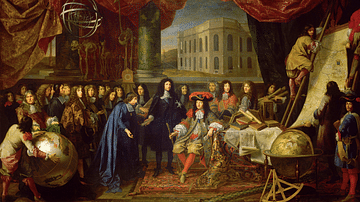Search
Did you mean: Phidias?
Search Results

Article
The Telescope & the Scientific Revolution
The invention of the telescope in 1608 is usually credited to the Dutchman Hans Lippershey. The astronomical telescope became one of the most important of all instruments during the Scientific Revolution when figures like Galileo (1564-1642...

Article
The Maya Calendar and the End of the World: Why the one does not substantiate the other
The Popol Vuh recounts the story of twins who journeyed to Xibalba. For the Maya, their round of adventures serves as a metaphor for timeless, repeating cycles and for the regeneration of earth and all living things. – Gene S. Stuart, Mayanist...

Article
Aristotle's On the Heavens
One of Aristotle's more famous quotes was, "All men naturally desire knowledge" ("πάντες ἄνθρωποι τοὺ εἰδέναι ὀρὲγονται φύσει") (Aristotle, Metaphysics, 1.980a.22). As a classical Greek philosopher, an ideology like this is required for producing...

Article
The Foundation of the Royal Society
The Royal Society was founded in 1662 to promote scientific research and increase our knowledge of the natural world. With royal patronage and a stellar membership of great minds, the society quickly gained international recognition for its...

Article
The Art of Dialectic & Zeno of Elea
The creation of the art of dialectic is credited to Zeno of Elea, the philosophical champion of Parmenides’ claim that the essence of reality is One and unchanging. Zeno was Parmenides’ student and protégé and, in defending and defining his...

Article
Roman Students in Athens
Training in oratory was a crucial part of Roman education; it was associated with a young boy's transition into adult life. As Athens was considered the intellectual centre of the eastern Mediterranean, many students undertook long journeys...

Video
The genius of Marie Curie - Shohini Ghose
View full lesson: http://ed.ted.com/lessons/the-genius-of-marie-curie-shohini-ghose Marie Skłodowska Curie’s revolutionary research laid the groundwork for our understanding of physics and chemistry, blazing trails in oncology, technology...

Collection
12 Great Scientists of the Scientific Revolution
In this collection, we gather together some of the greatest minds of the Scientific Revolution (1500-1700) when European science made great leaps forward, particularly in the fields of astronomy, microscopy, anatomy, and physics. Each scientist...

Image
A Beach in Chalcidice
A springlike coastal landscape in Chalcidice, Greece. Chalcidice was the birthplace of the Greek philosopher Aristotle. He was widely credited with founding the field of philosophy. His work has had a pervasive impact on human knowledge over...

Video
The Genius of their Age: Ibn Sina, Biruni, and the Lost Enlightenment
A vibrant portrait of an age when Arabic enlightenment anticipated and inspired the European Renaissance, illuminated by its guiding figures and rivals, Ibn Sina and Biruni. In The Genius of their Age, S. Frederick Starr follows up his...